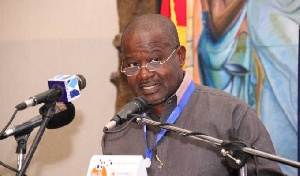The country and its citizens cannot remain on the fringes of the oil and gas industry, feeding off the crumbs of the big international players, in the form of unskilled labour, security, hotel accommodation and catering, among other peripheral jobs, Kwame Jantuah, CEO of the African Energy Consortium, has said.
“Does this actually allow us to earn some of the big monies in the industry? ...we need to move up,” Mr Jantuah said in Accra, at the fifth edition of the Local Content and Investment Summit of the Association of Ghana Industries.
In moving up, Mr Jantuah said government could decide, radically, that whilst the big boys slug it out in capital intensive offshore, the onshore prospects, which require just a “donkey head” and a “storage tank,” are reserved for locals.
“Before we even start onshore, we should make it quite plain that it is reserved for local indigenous companies,” he said.
Before that happens, however, government should map out the 40% of the country’s land mass that is said to have oil potential, so that when oil is discovered, parts of the land is reserved for agriculture, mining and other purposes, he said.
“A lot of Ghanaians want to go into the oil and gas industry but they don’t understand the technicalities of it. Ghana is lucky in the sense that we have two oil fields on stream. Others are coming on stream. However, if we wait for all those companies that have got contracts to start production we will get lost in it,” said Kwame Jantuah.
Norway’s colossal earnings of some US$882 billion of what it has saved and invested of petroleum revenues in two decades has brought into sharp focus what citizens of African countries are losing from the exploitation of their own petroleum resources.
Kwame Jantuah, who said his own struggles typify the hurdles locals encounter in the industry, reckons that there has to be a deliberate effort to build capacity within local companies.
“We cannot build capacity in all our local companies, but we can do the trainer-teacher based, where we take specific companies that understand the industry out there to learn it and come in and teach other companies,” he told the B&FT.
A number of indigenous players have expressed worry over what they see as deliberate attempts to deny them jobs in the industry with the excuse that locals lack capacity.
“What is it that we cannot do?” asked Alfred Fafali Adagbedu, CEO of Seaweld Engineering Ghana Limited, an indigenous company which fabricated component parts of the country’s second Floating Production, Storage and Offloading (FPSO) vessel.
“Seaweld is a Ghanaian company. Now if they give me any job, no matter what kind of job it is, I will recruit expertise, he can be a foreign national but he will come in and work for me whilst he is being understudied by Ghanaians. So, I can’t understand when they say local companies cannot do it,” Alfred Fafali told the B&FT last year.
Government records show that there are about 474 companies registered with the Petroleum Commission, out of which 351 are indigenously owned, whilst 46 are joint venture companies.
Government has reported recently that since oil production started in 2010, indigenous companies have earned contracts to the tune of US$1billion out of a total contract sum of US$6.2billion.
Government equally reports that 80% of jobs in the industry are filled by Ghanaians, although critics have questioned whether the value of those jobs comes anywhere near that of the relatively low number of expatriate jobs.
Local workers on rigs and the FPSOs often complain that their earnings tend to be way lower than those of their expatriate counterparts; they say even within Africa, including Nigeria and Angola, salaries of locals are way higher than what MODEC and other companies pay Ghanaian workers.
Business News of Saturday, 29 October 2016
Source: B&FT

















